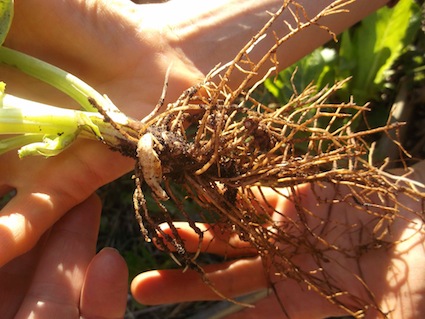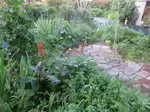Dear Reader, in this age of AI created content, please support with your goodwill someone who works harder to provide the human-made. Sign up at the top of the lefthand column or bottom of this page. You will receive my hand illustrated monthly newsletter RESTORE NATURE and access to the biodiversity garden design course as I write...and nothing else, I respect your time. I am also removing the advertizing as best I can as its become intrusive inappropriate and pays me nothing.
permaculture principles
for companion planting of organic vegetables

illustrating the interconnectedness underground: Karen shows us the roots of a brassica plant, which even have a rhizobium nodule; above the little finger of the rightmost hand
For a discussion of other permaculture principles I refer back to the first article which outlines some different types of plant guilds. This present article is the second in a series of five on the companion planting workshop I attended last month, presented by the permaculturists Karen Parkin (permaperson@gmail.com) and Saskia Schelling (saskia@gardencoach.co.za) who regularly present wonderful workshops on permaculture and growing organic vegetables.
more on the permaculture principles of companions and antagonists
Antagonism
Antagonism between plants means that they do not flourish in one another’s company, one or both being affected negatively. The most famous antgonists are alliums and legumes. Carrots and dill don’t flourish near strawberries.
Antagonism between plants can be due to chemical intolerances as above, or the creation of unsuitable growing conditions. For example as will be discussed, trees shade out sun loving plants and they do not flourish. For this reason Saskia plants her large evergreens on the south side of the garden. In the northern hemisphere it would be the north side of course. But 2.5 meters from the fence so that her neighbours get some sun.
Beneficial plants
Many plants are beneficial to other plants and this involves soil and plant chemistry. The elderberry repells aphids, but some plants attract insects and keep pests away from other plants. Nasturtiums repell some pests, but is also a trap crop for the cabbage butterfly’s caterpillars.
Plants with strong perfumes can confuse pests and make it harder for them to find their favorite foods. Vetiver grass has a strong lemon scent and is reputed in India as a pest repellent. This awareness can be incorporated when designing a mixed herb and vegetable garden.
Some plants are beneficial because of nutrient supply. Yarrow draws up Phosphorus, and Comfrey draws up Potassium, and they send the excess to where it is needed along the mycorrhiza growing underground. Mycorrhiza (latin for ‘fungus roots’) are the underground networks of thread like structures which grow from fungal spores. For this reason, mushrooms in the garden are a very good sign. Mushrooms are the fruiting bodies which spring up when the mycelium, or network of mycorrhiza is mature. The mycelial network has been found in recent horticultural research, to be able to transport nutrients from areas of high to areas of low concentration. Mushrooms show your fungal eco system is well developed, and your nutritional supply is healthy. Karen calls the mycelial web the wild world web.
On some legume plants, on their roots, rhizobium nodules occur. These contain bacteria. There are hundreds of different strains of nitrogen fixing bacteria which can ‘infect’ the roots of plants, and are released again when the plant dies. They bacteria take up nitrogen from the atmosphere and convert it to a form more readily useable by plants, fixating it in the nodules so that it can be absorbed by the roots so that the plant can utilize nitrogen for its growth.
more info on companions
This series of five articles on permaculture principles relation to companion planting comprises one on guilds, this one on antagonism and beneficial plants, one on planting a permaculture garden, dealing with garden pests, and on the permacultural principles of soil regeneration with the geoderm. More information about companions was available on the free handout, or companion sheet, available at the workshop. Saskia also had booklets on the subject for sale. The world wide web (which can be pretty wild at times) is also an excellent source of information on companion planting and the 12 permaculture principles. When in doubt, google it !
------
home page for other green ideas
------
vegetable gardening the natural low cost way
------
gardening and where it all started
------
link to the previous companion planting workshop page on plant guilds
------
link to the next companion planting workshop page on planting a vegetable garden
Restore Nature Newsletter
I've been writing for four years now and I would love to hear from you
Please let me know if you have any questions, comments or stories to share on gardening, permaculture, regenerative agriculture, food forests, natural gardening, do nothing gardening, observations about pests and diseases, foraging, dealing with and using weeds constructively, composting and going offgrid.
SEARCH
Order the Kindle E-book for the SPECIAL PRICE of only
Prices valid till 30.09.2023
Recent Articles
-
garden for life is a blog about saving the earth one garden at a time
Apr 18, 25 01:18 PM
The garden for life blog has short articles on gardening for biodiversity with native plants and regenerating soil for climate amelioration and nutritious food -
Cape Flats Sand Fynbos, Cape Town's most endangered native vegetation!
Apr 18, 25 10:36 AM
Cape Flats Sand Fynbos, a vegetation type found in the super diverse Cape Fynbos region is threatened by Cape Town's urban development and invasive alien plants -
Geography Research Task
Jan 31, 25 11:37 PM
To whom it may concern My name is Tanyaradzwa Madziwa and I am a matric student at Springfield Convent School. As part of our geography syllabus for this
"How to start a profitable worm business on a shoestring budget
Order a printed copy from "Amazon" at the SPECIAL PRICE of only
or a digital version from the "Kindle" store at the SPECIAL PRICE of only
Prices valid till 30.09.2023







